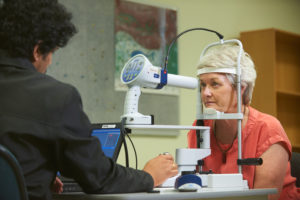A new eye-screening technology could tackle blindness in diabetes sufferers and cut out time-consuming specialist referrals.

Checking your eyes for signs of diabetic retinopathy could look like this in the near future.
Diabetes sufferers may no longer need to put time aside for costly visits to specialists to see if they are at risk of developing diabetic retinopathy (DR) – a vision disease which can lead to blindness. In our world-first trial, patients can pay a quick visit to their GP and get their eyes checked in about five minutes.
To bridge the gap between patients and specialists, we’ve teamed up with the Midland Railway Workshop GP Superclinic in Perth to test our Remote-I technology as a method for eye assessments.
Our Remote-I system scans the patient’s eyes and then sends the results to a remote specialist using cloud technology. The specialist can access the information from a desktop or tablet and can make a quick, accurate assessment of the patient’s eyes.
We are also testing our new Dr.Grader software, which processes the images and can alert the appropriate GP or specialist if the patient is at risk of developing DR.
“One in three people with diabetes are living with DR vision loss or blindness, but the condition can often be prevented by early detection and timely treatment,” says our very own Professor Yogi Kanagasingam, who is also the trial leader for this project.
The partnership aims to cut down unnecessary referrals to eye-care specialists by providing GPs with effective assessment tools, freeing up time and resources for those who need it the most.
“This tool provides a valuable adjunct in the delivery of our comprehensive one-stop diabetes services that already exist on site,” says Dr Amitha Preetham, Director of the GP Superclinic at the Midland Railway. “GPs upskilled in diabetes work alongside other specialists and a wide range of allied health services ensure that healthcare is patient centered.”
The technology could make disease management a lot easier and efficient, particularly for those in rural areas who may not be able to access specialist care when it’s most needed.
The trial will test 200 patients over the course of six months and has the potential to revolutionise the way we manage diseases that require early detection to be managed effectively.

